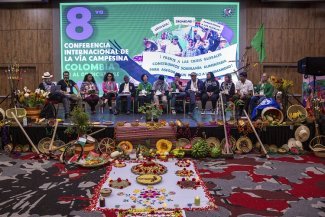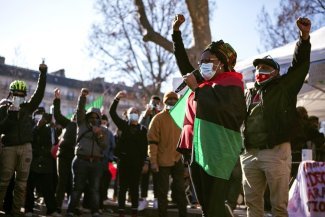Tens of thousands of Indonesian protestors took to the streets of Jakarta on Wednesday and Thursday to demand higher wages, better working conditions and free health care.
The Southeast Asian nation is one of the world’s fastest growing economies, but not all Indonesians are enjoying the benefits of economic growth, as almost 40 per cent, or up to 20 million, of 35 million people working in the formal sector, have been underpaid and left unprotected.
Indonesian workers, who marched through the city culminating in a rally outside the Presidential Palace, are calling on the government – and employers – to abide by the current ministerial decree to limit outsourcing, exclude workers from having to pay contributions to the national healthcare program and end cheap labour.
The latter point resulted in the government promising workers in Jakarta a 44 per cent increase on the minimum wage this week, setting the figure at 2.2 million rupiah ($228) a month as of next year.
But workers across the country are calling for reforms and wage increases.
Similar rallies have taken place in West and East Java, home to more than 40 industrial estates and more than 25 million workers.
Strikers were also protesting a move by the Association of Entrepreneurs to try and block regulations on outsourcing, which were recently revised to limit the widespread practice to just five sectors – security, catering, driving, cleaning and mine support-services.
‘Fight for justice’
The demonstration, which also involved hundreds of students from several universities, was jointly organised by Confederation of All-Indonesian Workers Union (KSPSI), Confederation of Indonesian Workers Union (KSPI), Confederation of Indonesian Prosperity Labor Union (KSBSI) and the Indonesian Workers Organisation (OPSI).
“The time has come for us to fight for justice at present and not to wait for donations or charity from employers,” KSPI chairman Said Iqbal said in a free speech forum near the Presidential Palace.
On Wednesday, thousands of workers organised by the National Workers Union (SPN) besieged the Presidential Palace, demanding that President Susilo Banbang Yudhoyono issue a government regulation in lieu of law requiring employers to pay their workers’ contribution to the national healthcare program in line with the recent verdict of the Constitutional Court.
The verdict, in reviewing the 2004 social security system law, put the social security programs’ contribution on employers’ shoulders.
Iqbal said most workers are underpaid and so they shouldn’t have to pay a premium for national healthcare because it was part of their constitutional right.
KSBSI chairman Mudhofir said that having seen an average growth of six per cent year-on-year since the economic downturn that hit Asia in 1997, the Indonesian government should be in a position to end the practice of cheap labour.
“Workers can no longer exercise their patience,” he said, adding that workers would continue to press the government to accept the list of 80 wage components to provide decent salaries.
The Minister of Manpower and Transmigration Muhaimin Iskandar called on strikers to return to work.
“With the two-day strikes, both workers and employers lose millions of working hours, halt industrial process and suspend company production.
“It is better for labour unions to channel their aspirations through the National Social Security Committee (DJSN) to be brought to the plenary session with relevant stakeholders in preparing the draft regulations to implement the social security programs,” he said.
The minister also said the government could not unilaterally raise the minimum wages because it had to consider the country’s business interest and repair the investment climate to generate more jobs.
“Workers should bear in mind that employers or investors should be encouraged to develop their businesses and make profits to enable them to pay their workers well,” he said.









